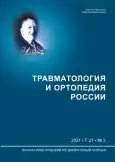The Optimal Surgical Needle for Tendon Suture: Cutting Edge or Reverse Cutting Edge?
- 作者: Zolotov A.S.1, Isokov S.K.1, Isokova A.K.1
-
隶属关系:
- Far Eastern Federal University
- 期: 卷 27, 编号 2 (2021)
- 页面: 75-80
- 栏目: Theoretical and experimental studies
- ##submission.dateSubmitted##: 05.01.2021
- ##submission.dateAccepted##: 02.04.2021
- ##submission.datePublished##: 19.04.2021
- URL: https://journal.rniito.org/jour/article/view/1577
- DOI: https://doi.org/10.21823/2311-2905-2021-27-2-75-80
- ID: 1577
如何引用文章
全文:
详细
Background. Achieving a durable connection between the lacerated tendon ends is difficult. The outcome of treatment depends on many factors. Several authors consider the properties of the surgical needle used for suturing the tendon to be important. The aim of the study— to compare the strength of the tendon suture applied with the conventional cutting edge and reverse cutting edge surgical needles in the experiment.
Materials and Methods.We used porcine tendons for the experiment. The tendon fragments were divided into 2 groups of 20 tendons each. On all 40 tendons, the same type of “injury” of the tendon was simulated — using a scalpel. In the first group, the interrupted suture of the tendon was applied with a cutting edge surgical needle, in the second group — reverse cutting edge. Laboratory tests of the tendon sutures strength were performed on the improvised stand.
Results.In the first (suture made with a cutting needle edge), diastasis of 2 mm was determined at an average load of 1219.5 g (m = ±76.56, where «m» is the representativeness error). Complete suture failure occurred at an average load of 1770.8 g (m = ±100.02). In this group, the thread rupture was not recorded. In the second group (a suture made with a reverse cutting edge needle), diastasis occurs with an average load of 1754.75 g (m = ±77.32). Complete suture failure occurred at an average load of 2571.25 (at m= ± 103.78). In three cases, the thread ruptured. In the second group (reverse cutting edge needle), the tendon suture strength was statistically significantly higher than in the first group.
Conclusion. The tendon suture strength depends on the surgical needle properties. In tendons reconstruction the reverse cutting edge needle use is more preferable compared to the conventional cutting edge needle use.
作者简介
A. Zolotov
Far Eastern Federal University
Email: dalexpk@gmail.com
ORCID iD: 0000-0002-0045-9319
Aleksandr S. Zolotov — Dr. Sci. (Med.), Professor
Vladivostok
俄罗斯联邦S. Isokov
Far Eastern Federal University
编辑信件的主要联系方式.
Email: sultanisakov5@gmail.com
ORCID iD: 0000-0001-7971-3174
Sultonali Isokov
Vladivostok
俄罗斯联邦A. Isokova
Far Eastern Federal University
Email: aziza19-99@mail.ru
ORCID iD: 0000-0001-8344-6769
Aziza Isokova
Vladivostok
俄罗斯联邦参考
- Jong J.P. de, Nguyen J.T., Sonnema A.J.M., Nguyen E.C., Amadio P.C., Moran S.L. The Incidence of Acute Traumatic Tendon Injuries in the Hand and Wrist: A 10-year Populationbased Study. Clin Orthop Surg. 2014;6(2):196-202. doi: 10.4055/cios.2014.6.2.196.
- Золотов А.С., Зеленин В.Н., Сороковиков В.А. Хирургическое лечение повреждений сухожилий сгибателей пальцев кисти. Иркутск: РИО НЦ РВХ ВСНЦ СО РАМН, 2006. 110 с.
- Byrne M., Aly A. The Surgical Needle. Aesthet Surg J. 2019;39(Suppl_2):S73-S77. doi: 10.1093/asj/sjz035.4. Lam W.L., Garrido A, Vandermeulen J., Fagan M.J., Stanley P.R.W. Cutting or round-bodied needles for tendon repair. J Hand Surg Br. 2003;28(5):475-477. doi: 10.1016/s0266-7681(03)00169-4.
- Construction Flexor Tendon Repair Assessment Tool. Creation of Reproducible Testing Method. ASSH. Available from: https://www.assh.org/s/surgical-simulation.
- Tang J.B. New Developments Are Improving Flexor Tendon Repair. Plast Reconstr Surg. 2018;141(6):1427-1437. doi: 10.1097/PRS.0000000000004416.
- Iwanaga y., Morizaki y., Uehara K., Tanaka S., Sakai T., Saito T. Robust Suture Combination for Rat Flexor Tendon Repair Model. J Hand Surg Global Online.2020:354-358. doi: 10.1016/j.jhsg.2020.08.004.
- Winters S.C., Gelberman R.H., Woo S.L., Chan S.S., Grewal R., Seiler J.G. 3rd. The effects of multiplestrand suture methods on the strength and excursion of repaired intrasynovial flexor tendons: a biomechanical study in dogs. J Hand Surg Am. 1998;23(1):97-104. doi: 10.1016/s0363-5023(98)80096-8.
- Wong y.R., Tay S.C. A Biomechanical Study of a Novel Asymmetric 6-Strand Flexor Tendon Repair Using Porcine Tendons. Hand (N Y). 2018;13(1):50-55. doi: 10.1177/1558944716685829.
- Kang G.H., Wong y.R., Lim R.Q., Loke A.M., Tay S.C. Cyclic Testing of the 6-Strand Tang and Modified Lim-Tsai Flexor Tendon Repair Techniques. J Hand Surg Am. 2018;43(3):285.e1-285.e6. doi: 10.1016/j.jhsa.2017.08.014.
- Грицюк А.А., Середа А.П. Ахиллово сухожилие. М.: РАЕН, 2010. 313 с.
- Wallace S.J., Mioton L.M., Havey R.M., Muriuki M.G., Ko J.H. Biomechanical Properties of a Novel Mesh Suture in a Cadaveric Flexor Tendon Repair Model. J Hand Surg Am. 2019;44(3):208-215. doi: 10.1016/j.jhsa.2018.11.016.
- Galvez M.G., Comer G.C., Chattopadhyay A., Long C., Behn A.W., Chang J. Gliding Resistance After Epitendinous-First Repair of Flexor Digitorum Profundus in Zone II. J Hand Surg Am.2017;42(8):662.e1-662.e9. doi: 10.1016/j.jhsa.2017.04.013.
- Lim R.Q.R., Wong y.-R., Loke A.M.K., Tay S.-C. A cyclic testing comparison of two flexor tendon repairs: asymmetric and modified Lim-Tsai techniques. J Hand Surg Eur. 2018;43(5):494-498. doi: 10.1177/1753193418758828.
- Tang y.Q., Mao W.F., Wu y.F. A new and accurate method to quantify gap formation in tendon repairs. J Hand Surg Eur. 2013;38(7):808-809. doi: 10.1177/1753193412455286.
补充文件







